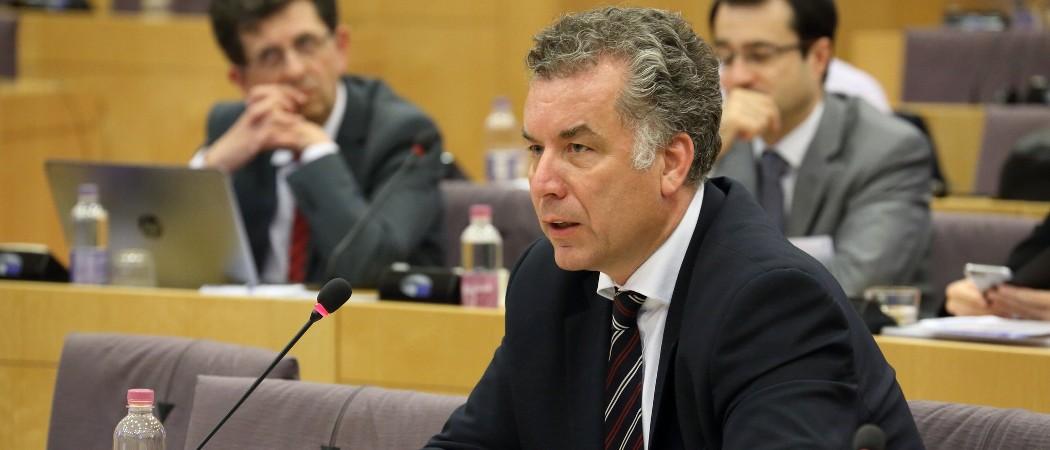Proposed €663M cuts reversed, but despite pressure from MEPs there is no major increase for research and innovation in next year’s crisis-oriented EU budget

Christian Ehler, MEP, budget rapporteur for Parliament’s industry, research and energy committee ITRE. Photo: ASD Europe / Flickr
EU policymakers have reached a deal on the budget for next year, and with the focus squarely on tackling the fallout from the war in Ukraine and the energy crisis, research and innovation do not feature at the top of the policy priorities.
After weeks-long negotiations, the European Parliament and the member states last night settled on a €12.4 billion budget for the Horizon Europe research programme in 2023. The final result reverses a €663 million cut proposed by member states, and adds around €10 million in funding for energy and climate-related research, compared to the draft budget proposed by the European Commission in June.
Christian Ehler, MEP, budget rapporteur for Parliament’s industry, research and energy committee ITRE, welcomed the reversal of the “absurd cuts on Horizon” proposed by the Council of member states, but did not hold back on criticising the continued attacks on EU research funding.
“Their zero sum approach to the budget is completely removed from any policy objectives the EU institutions set together - policy objectives the Council agrees to. The Green Deal will not work without investments in Horizon. Our digital transformation will not work without investments in Horizon,” said Ehler.
He noted that while the proposed budget was not cut, Parliament failed to stop €650 million of commitments to Horizon that were unspent over previous years, from being diverted away from research. This “effectively represent[s] a cut,” said Ehler.
With the EU in crisis mode, researchers were not surprised with the final result, despite campaigning for extra funds and Parliament calling for a €311 million increase.
It’s a matter of perspective, said Thomas Estermann, director for governance, funding and public policy development at the European University Association. “The increases go into where everyone can agree on priorities. In that sense I would say there are no surprises,” said Estermann. “On the positive side, we can say that Horizon gets a bit more money; not at the level that the Parliament wanted but still more.”
Other stakeholders are hesitant to jump to conclusions before the full breakdown of the numbers is released, but welcomed the news on the reversal of cuts to research. “We are waiting for the details on the figures to see if the agreement is good or not,” said Muriel Attané, secretary general of the European Association of Research and Technology Organisations.
There’s also a sense of relief. If the negotiators had failed to strike a deal before midnight, the Commission would’ve had to put forward a new proposal for the budget, likely pushing its adoption into the new year. "I am relieved that it is agreed and that we avoid going back to the drawing board as that would have caused uncertainties across all activities that the EU is funding, including for European research, innovation and education," said Mattias Björnmalm, deputy secretary general of the science and technology university association CESAER.
Long-term thinking
Across the rest of the EU budget, Parliament managed to secure an extra €1 billion for tackling the energy crisis, inflation and the war in Ukraine. The latter in particular has been reinforced in the new deal. “This has got the biggest chunks and it is normal, because it is also a budget for war,” Parliament’s budget negotiator Nicolae Ştefănuță told a press conference.
Here, Erasmus+, the EU’s education fund that is now helping students and teachers fleeing Ukraine, is getting €120 million more, bringing its total budget for next year to €3.7 billion.
In 2023, the focus will fall on addressing the ensuing crises, but long-term thinking will be imperative if the EU wants to achieve its green and digital policy goals, a necessity as the climate crisis looms.
“It’s a crisis budget, but it is no basis for long-term thinking. What would be important is to find a balance between what is an urgent crisis and where you need to invest to set up for the long-term future,” said Estermann.
He noted Parliament had been vocal about this, making it clear that not much can be done within the scope of the EU’s current seven-year budget, the multiannual financial framework (MFF). MEPs have continuously called for a revision to add more money before the next budget cycle starts in 2028, throughout the budget negotiations.
“The discussion has been very tough because we live in a time where the MFF is not fit for purpose. I think MFF review is urgently needed,” said Ştefănuță.
Ehler echoed the sentiment. “We are reaching the limits of what can be reasonably be expected of the union budget. We used most of the flexibility and we still need to find funding for new initiatives like the Chips Act. Therefore, a genuine review of the MFF is clearly needed,” said Ehler.
The European Commission, meanwhile, is preparing an “ambitious” budget review in 2023, looking to offer more flexibility to divert money to areas such as energy and defence technologies. But Estermann fears member states, which always look to save money, may impede this effort.
While Brussels deliberates long-term strategy, the Council and the Parliament will formally adopt the budget agreement for next year in the coming weeks, with the vote in Parliament scheduled for 23 November.





 A unique international forum for public research organisations and companies to connect their external engagement with strategic interests around their R&D system.
A unique international forum for public research organisations and companies to connect their external engagement with strategic interests around their R&D system.